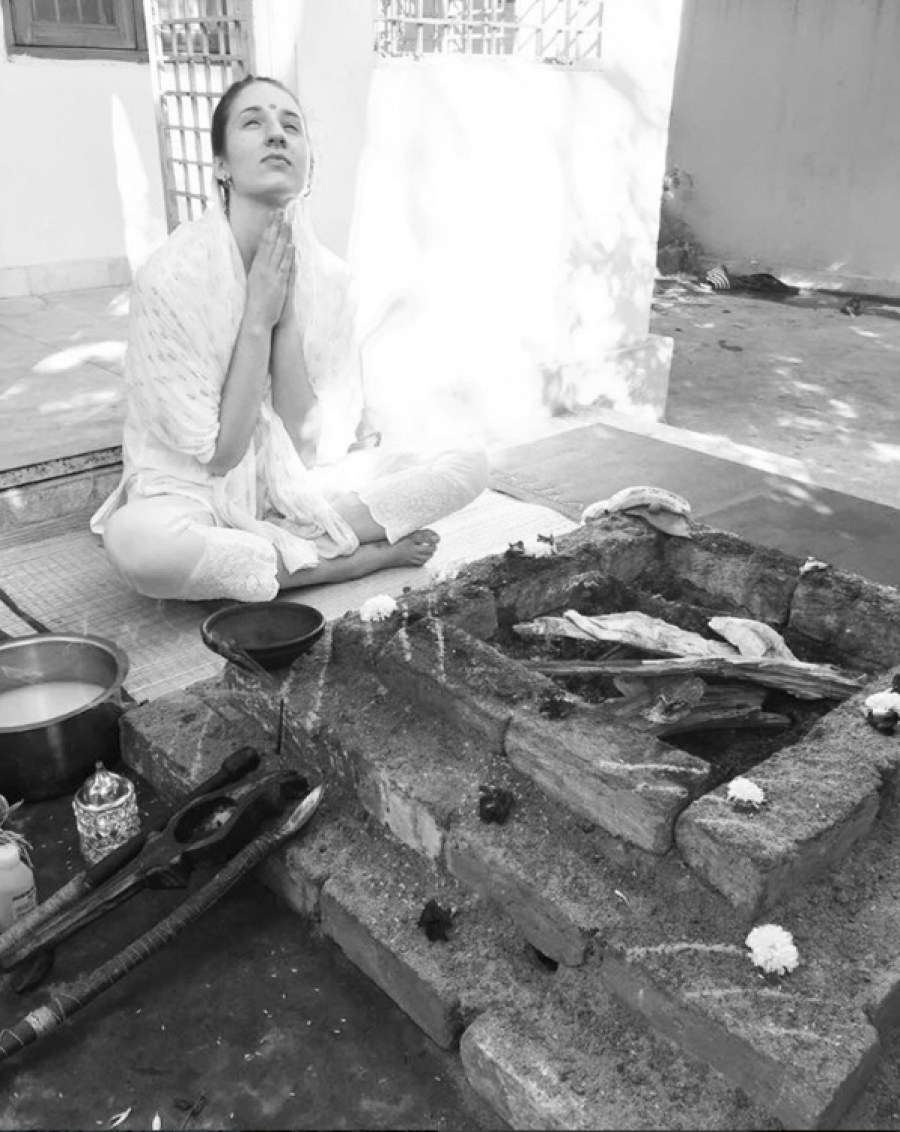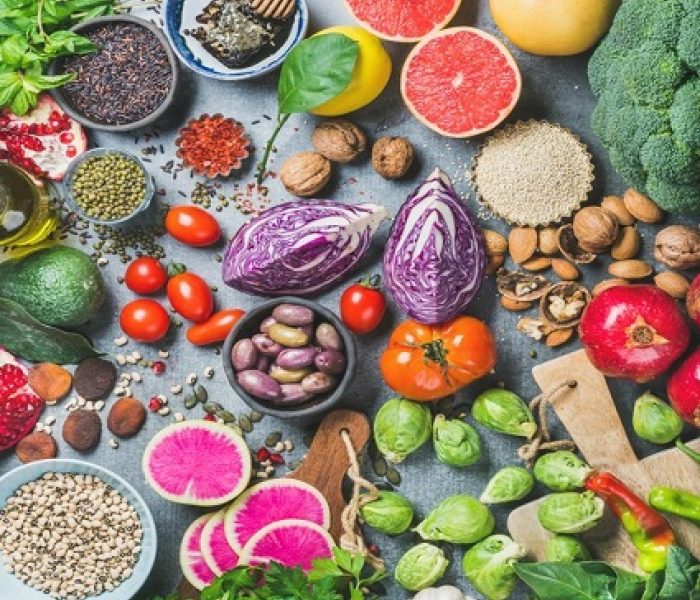A Former Drastic Fad Dieter On Ayurveda & Weight Loss
Narissa Moeller is an Ayurvedic Lifestyle Consultant, Therapist and Writer. Once a drastic fad-dieter, she is now committed to living a healthy lifestyle and sharing this ancient knowledge in the modern world. Here she explains why eating salad everyday might make you lose weight but could be wrecking havoc on your nervous system and metabolism.

Tell us a bit about your own health journey and how you got into the wellness industry?
Ever since I can remember I’ve been health-conscious. I was doing lemon detoxes in high school, but my real health journey began when I was diagnosed with Glandular Fever in Year 12. After that, I had a snowball of illness. From depression and low self-esteem due to bullying to skin conditions from the stress of it all. I also had some rare form of Hepatitis from food poisoning that left me bed-ridden for months. I was taking a lot of medication to cover everything up.
I then moved to Sydney at 21 to pursue Journalism and magazines. I literally hit the ground running with work and began experimenting with a lot of fad-diets. I was calorie counting, I went paleo, vegan, dairy-free, gluten-free. I was going to the gym and pushing myself just trying to fit in with the Sydney lifestyle. On the outside everything looked great, on the inside I had never felt worse. My anxiety was high, I was also suffering insomnia, months with no menstrual cycle, poor digestion and still really bad skin. All my doshas (bio-elemental make up) were completely a mess and I was only getting worse.
A photographer I was working with at the time introduced me to Vedic Meditation. I learnt with a teacher who then introduced me to Yoga and Ayurveda (they are sister sciences). I slowly started incorporating Ayurvedic principles into my life such as drinking hot water and herbal teas, eating freshly prepared, cooked food (I was a huge salad girl before) and meditating every day. As my mind and body started to purify itself, I began to feel better and all my symptoms just naturally started to balance themselves and go away. It felt so effortless.
I fell in love with the whole science and philosophy as it just has an answer for absolutely everything. I wanted to know more so I went back to study in Australia and with doctors in India where I have undergone more intense (all natural) detoxification programs. Understanding your unique body make-up and the state it is currently in is key as I’m no longer trying to do what everyone else is doing. Ayurveda is a journey of returning to your very own true nature which is health and happiness.
In your opinion what are the three biggest myths when it comes to weight loss and health?
- That you need to exercise and push yourself to the extreme.
- Fad diets because they never work.
- That salads will make you lose weight. This isn’t a myth because you may lose weight eating salad but you’re actually drying out your digestive track which will cause an unstable nervous system (vata imbalance) and contribute to irregular metabolism.
How does the Ayurvedic approach to weight loss differ from more traditional methods?
Ayurveda looks at every single person as unique. Whilst there are three main body-types each with their own set of guidelines, you are still unique. A healthy Vata or Pitta person shouldn’t need to lose weight. Kapha types are naturally bigger people and should embrace it. If you’re Kapha and trying to look like a Vata, you’re going to be extremely unhealthy and unhappy because it’s not how you are naturally developed.
Ayurveda is about living in tune with nature and that means being adaptable in an ever changing world. It focusses on removing toxins everyday through cleansing practices and increasing your digestive power through a natural diet and herbs. With a strong digestion, you can eat anything and not put on weight. Ayurveda is not a quick way to lose weight, it’s living a long healthy life.
What are the benefits of embracing this holistic approach?
Holistic looks at absolutely everything. It looks at your diet, lifestyle, environment, relationships, your job, emotions, past trauma, everything. All these things can cause imbalance and disease if they are not right for you. Essentially, it’s about knowing yourself, your likes and dislikes, moving away from things that aren’t right for you. The way to do this is though developing your self-awareness. Knowing yourself. Disease happens when we move too far away from who you are. Following this approach, you will live a life that is very aligned with yourself, nature and your purpose.

How can we identify what dosha we are?
Everyone has all three doshas inside of them, however one or two is always more dominant. It’s not that important that we know what it is. What is important is our current state, known as our Vikruti. This however changes constantly, with the time of the day, with what’s going on in your life, the season, if a particular hormonal cycle is occurring. It’s great to learn about all three doshas, their qualities, tendencies, and you will be able to know which one is more dominant in you and then make appropriate diet, lifestyle and seasonal changes. In Ayurveda, living in tune with the season is of primary importance.
If you want to go deeper into your dosha, it is best to see an Ayurvedic practitioner.
Can you give a brief run down on what foods the different dosha's need to include and avoid for optimal weight loss and wellness.
Vata being cold and dry, likened to Autumn and early winter. They are naturally thin, boney and light and don't need to lose weight, rather eat foods that bring warmth, nourishment and grounding. Favour sweet, sour and salty tastes found in warm, cooked wholefoods, root vegetables, grains, lentils, nuts, boiled full-cream milk and good quality ghee and oils.
Pitta being hot and fiery, likened to summer. They are of medium build and have the strongest metabolism. It’s important they favour cooler and lighter foods such as green leafy vegetables, fruits, thin lassi, coconut oil and ghee.
Kapha being dense and wet, is likened to later winter and spring. Kapha-types are naturally heavier built and need warmth and stimulation in all areas of life. For optimal health, they need to avoid sweet and heavy foods such as meat, cheese and ice-cream and eat light pungent foods including kitchen spices.
For a more in depth look at Ayurvedic nutrition, check out this article on my blog.
What would you say are the top 7 Ayurvedic Secrets for Weight Loss?
- Meditation and mindfulness. Stress the greatest hurdle to losing weight. Your body cannot burn fat when the flight or fight response (sympathetic nervous) is turned on, which is typically is far too often in our modern lifestyle. I highly recommend Vedic Meditation for its effectiveness.
- Sipping hot water frequently throughout the day to naturally flush out toxins.
- Triphala. This is a daily detoxification herbal formulation made from three plants that everyone should take. It is best taken daily before dinner.
- Daily oil massage for moving the lymph and increasing metabolism.
- Movement. Don’t be sedentary. If you have a desk job, get up every hour and do a few minutes of moving the body and the spine in all directions. Do easy exercise daily. Ensure to not over exert as this will activate the sympathetic nervous system.
- Eat a lighter dinner. We are not meant to digest food at night, so when our body gets burdened with a heavy meal, it stores to toxins in the fat cells.
- Panchakarma detoxification program. Fastest way to lose weight and reset your digestion.
I'd also like to add listening to your body and only eating when you are hungry. We are so conditioned to think we need three meals a day. We don’t, eat when you feel the fire in your belly. If you don’t feel the fire, your digestion is weak and needs strengthening.

What are the benefits of following an Ayurvedic diet as opposed to a popular one like keto or paleo?
If we take a seasonal approach, Keto only naturally occurs in Spring whereas Ayurveda is cyclical. Nature beautifully provides us with what we need at that time of the year so it is best to align ourselves with this. This is why Ayurveda has lasted so many thousands of years and food fads last a few years before dying off.
Ayurveda also focusses not only what you eat, but how you prepare food and eat it. The use of herbs and spices help break down heavy foods such as carbs and meat so that they digest better and distribute the nutrients around the body.
It also the time of the day that you eat. Eating heavy foods such as meat or carbs is best at the lunch time when our digestion is at its strongest. Eating them at night will lead to weight gain and heaviness in the next day.
Ayurveda takes so many things into account but it really is about listening to your own body’s needs. The most important thing in every diet is that you are eating foods from nature, loads of seasonal fruit and veg, nothing processed or carrying preservatives.
What part does exercise play in an Ayurvedic weightloss plan?
Ayurveda recommends exercising daily. The best exercise is always yoga for mind, body and spiritual health. Walking and swimming is also good. Listen to your body. If you’re feeling Vata which is light and airy, then do some grounding exercise such as yin yoga or walking in nature. If your feeling Kapha which is heavy and lethargic, go work up a sweat somewhere. Listen and take action.
Having Ayurvedic treatments is also equivalent to exercise and brings about the same benefits, especially oil massage.

Anything else to add?
Develop your consciousness through daily meditation and naturally your body will know what it needs to balance itself. Never compare yourself to others and always follow what you love and feels enjoyable in all areas of life. Everything in balance and moderation. And remember, it’s a journey, it takes time.


